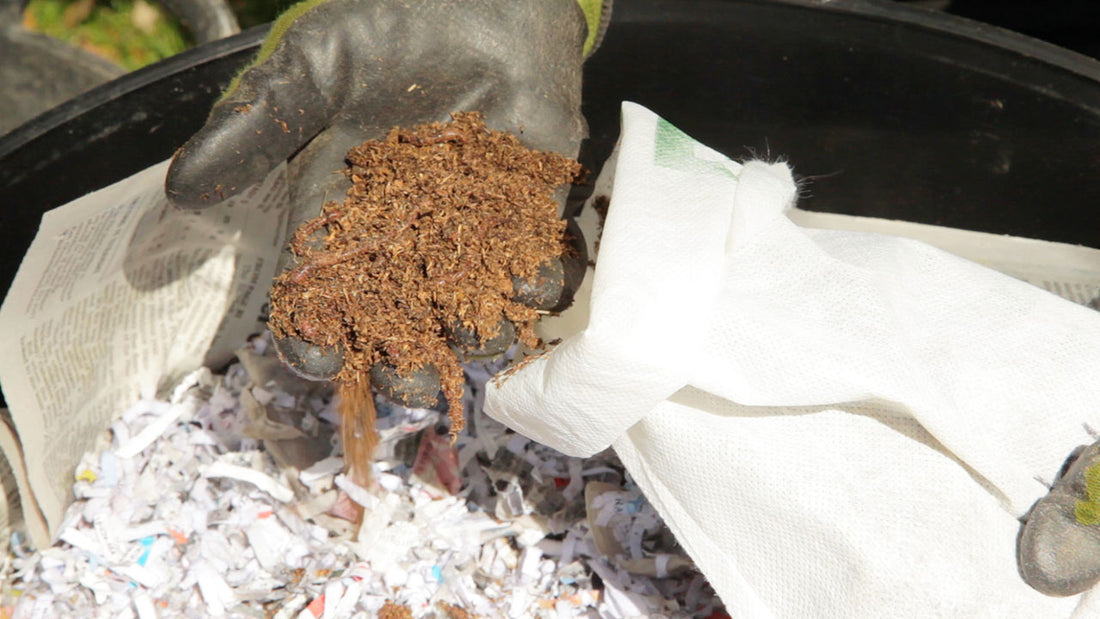How To Diagnose Issues With Worm Composting
Worm bins are a wonderful way to quickly compost your kitchen scraps, a great teaching tool for children and a good source of rich compost for the garden. So now you have set up your worm bin, worms are happily eating your kitchen scraps and then you notice things are not quite right. There are some common problems with worm bins and most are pretty easy to fix. 
Does Not Smell Right
A healthy worm bin should have relatively no odor. If your bin starts to smell funny then some things may be wrong. Causes of odor may be from excess moisture, adding the wrong food (no meat, dairy or citrus) or over feeding your worms. Cut back on feeding, make sure the reservoir is drained and do not add any dairy, meat or citrus.
Top Reasons Worms May Be Leaving or Dying
Temperature Extremes
Red worms prefer temperatures between 55 - 77°F. Worms will die in freezing temperatures and if the bin gets too hot they will try to escape to cooler areas. Keep the bin in the shade in the summer and in the winter bring it in a garage or shed to keep it warm enough.
Too Much Worm Castings (poop)
The worm bin should be harvested to remove the castings about twice a year. You may need to retrieve some of the worms from the castings, but most of them should be up in the active layer. Replace the bedding.
Bin is Too Dry
Worms need moisture to live and will either die or leave to find better conditions.
Bin is Too Acidic
Something in the bin has made the material too acidic and the worms don't like it. Try adding some crushed egg shells, a handful of oyster shell lime, or remove as many worms as possible and start over. Remember no citrus.
Ants Living in Bin
If the bedding material is not kept moist enough ants will take up home in the bin. Just keep the bin moist since ants really like dry conditions.
Other Critters in the Worm Bin
If you find certain other creatures living in your bin, don't worry, there are other composting helpers.
Black Soldier Flies
Are common helpers to the bin and normally are not a problem but if left unchecked, may out-compete the worms for food. You may just want to keep an eye on them and if number are getting too high, pick them out and either toss in your outdoor compost bin, or if you have chickens, give them a treat.
Pot Worms
Another common inhabitant of the worm bin are pot worms enchytraeids (en-kee-TRAY-ids) or white worms. They are composters and won't be harmful to your redworms. If you find a lot of them, it may be an indication that the bin is too acidic. You can add some crushed egg shells or a handful of oyster shell lime.
Millipedes
They like to feed on decaying plant tissue and should not be a problem in your bin.
Centipedes
Can be found in worm bins and probably should be removed if found. These guys can be damaging to small red worms.
Red Spider Mites
Very common in worm bins and usually found when feeding bread to the bin. Only a problem when their population is high and you notice your worms disappearing. To get rid of them put in a slice of bread (they are attracted to it) then the next day remove the bread with the mites. Repeat this process until you are happy with the reduction of mites.
Fruit Flies
Are usually attracted to rotting fruit or sweet "smelling" scraps. Cut fruit into small pieces so the worms can eat it more quickly. Another solution is to bury the scraps deeper into the top layer in addition to adding a couple layers of damp newspaper over the top layer. This helps keep the fruit flies from accessing the fruit scraps. Hanging a yellow sticky trap near the worm bin will also catch some of the adult fruit flies. Keeping redworms for composting is fun and easy. Follow the directions for setting up the worm bin and your worms should be working hard to create the brown gold for your garden.
Learn more about vericomposting with our video in the Resource Center.

